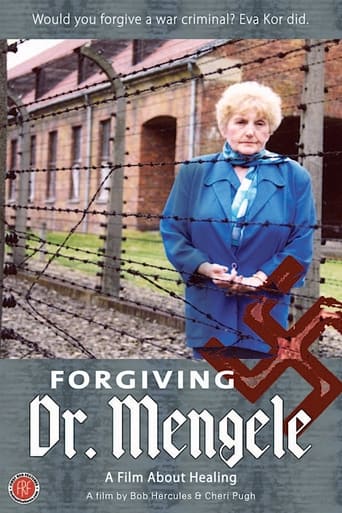
Forgiving Dr. Mengele
February. 24,2006Eva Mozes Kor, who survived Josef Mengele's cruel twin experiments in the Auschwitz concentration camp, shocks other Holocaust survivors when she decides to forgive the perpetrators as a way of self-healing.
Similar titles


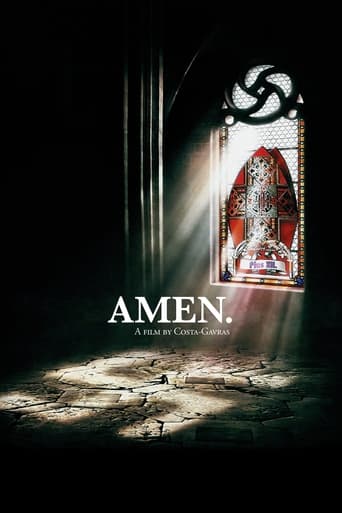
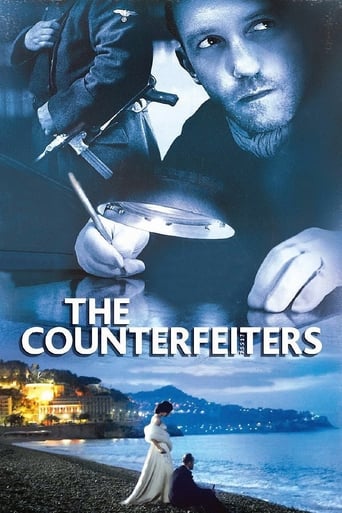
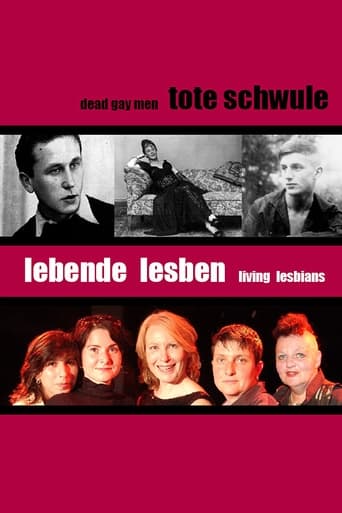
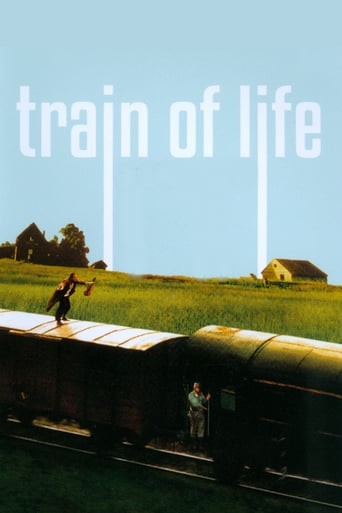
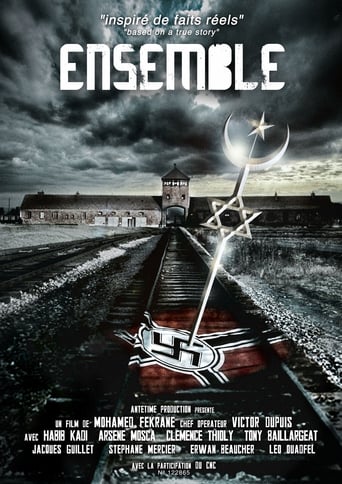
Reviews
Thanks for the memories!
The performances transcend the film's tropes, grounding it in characters that feel more complete than this subgenre often produces.
This is a small, humorous movie in some ways, but it has a huge heart. What a nice experience.
Not sure how, but this is easily one of the best movies all summer. Multiple levels of funny, never takes itself seriously, super colorful, and creative.
The first half of this documentary is very strange, mostly focusing on Eva's life flashing back and forth with scenes of Auschwitz, like a demented version of Kubrick's famous 2001 switcheroo. Although we do feel sympathetic for Eva by the 20 minute mark, having learned about her troubled adulthood in a world where the Holocaust was silently passed over, the directing is almost too kitschy and weird to be a Holocaust documentary. It was not pleasant viewing.The film picks up around the 25 minute mark when Eva's quest to raise awareness of the Holocaust takes an unexpected turn. She does not only want guilt and shame, she wants the Germans to know her forgiveness. We hear some fascinating debates, but only for a few minutes. Perhaps the directors didn't want to bore us with real conflict and debate.Midway through, and again all too briefly, we get to see a real treat: a one-room Holocaust "museum" built not with government dollars and NGO support, but by and for a single woman who wanted people in her small town to know her story. With this you start to understand the real meaning and importance of Holocaust education for ordinary people. But this segment ends abruptly.Then, two unrelated segments. First, Eva's own capacity to listen and forgive is given a test when she meets with Palestinians. Here, she does not come off as very compassionate at all. This was hard to watch, and again, not pleasant. Finally, inexplicably, Eva's museum is burned down in an act of arson. This is also dealt with all too briefly. We don't see the museum being rebuilt or a new plan being drawn up -- but a new museum does appear for a split-second shot.All in all, an uneven and unsatisfying film, that introduces us to an independent thinker, but doesn't seem to take her very seriously.It is never explained why Eva wears blue every day.
Eva Kor is the reason to see this film. She is charming, heroic, and a model of strength, determination, and love in action. She and others like her are living proof that evil's victories are always temporary.I was afraid to watch "Forgiving Dr. Mengele." Hitler was one of the most evil men who ever lived, but, as far as I know, Hitler didn't personally kill or torture anyone. Josef Mengele, on the other hand, used medical tools and procedures to torture innocent victims at Auschwitz. Mengele focused on children, and on twins. Mengele is the stuff of nightmares.I hesitated before popping the DVD in the machine. In combat, Mengele won the Iron Cross for rescuing two German soldiers from a burning tank. Retired from the front and sent to be "camp doctor" at Auschwitz, he destroyed countless innocent lives. After the war, Mengele escaped, with the support of many German and South American friends, and died a free civilian's natural, comfortable death in 1979. I began thinking about what kind of hell would be appropriate for a Josef Mengele. I wondered what he thought about before he went to sleep at night.Once the DVD began playing, I quickly realized that "Forgiving Dr. Mengele" isn't about Mengele at all. It's about Eva Kor, a delightful and inspirational human being. She's a real estate agent in Terre Haute, Indiana. Kor, a well-dressed senior citizen with a Mitteleuropa accent, is shown bustling about, hammering in lawn signs that advertise property for sale, guiding potential buyers, and making grilled cheese sandwiches for her two loving children and her husband in their modest suburban home. Kor is a woman of action, not reflection. In spite of her age, she moves like a bullet, directly toward her target. She acts, rather than sits and ponders. You know she loves her family because she feeds them. Her daughter describes Kor as "unhesitant," and the viewer agrees. Kor is shown giving inspirational speeches to school children, and opening up her own, small, Holocaust memorial museum. Kor and her twin sister Miriam were survivors of Mengele's torture.Kor met with a former Nazi doctor, Hans Munch. Munch had resisted Nazi commands to take part in selections that condemned prisoners to death. He also engaged in ruses to protect prisoners' lives; former prisoners testified to this after the war. Munch was acquitted of war crimes. In 1995, Kor and Munch together issued a statement condemning the Holocaust. Kor forgave Munch. Kor was asked if she could forgive Mengele. After much thought, she said she could. Kor was challenged and her stance was rejected by other survivors.The film shows Eva Kor at home, in schools, and at her museum. It shows her meeting with Munch and speaking with him at Auschwitz. The film also shows other twin survivors saying that they can't forgive Mengele. Finally, there is a brief, awkward and out-of-place meeting between Eva Kor and Muslim Arabs, lead by Sami Adwan. Kor appears to be the only Jew at the meeting. She is confronted by several Arabs who, while glaring at Kor with undisguised hate, proceed to tell her that Jews are responsible for all the problems in their lives, and that Jews never lived in Israel before 1945. They're wrong on all counts – they get both their facts wrong and their approach. It is simply distasteful to recruit an elderly, female, Holocaust survivor, get her alone in a room, and harangue her with blatant anti-Semitism. The film doesn't comment on this encounter. No conclusion is reached. One wonders why it was included.There are a few things I wish the film had done differently. I would have liked more background on Kor's biography. What was life like after she left the camp and returned to Romania? How did she travel to Israel, and then the US? Most importantly, I never understood Kor's definition of the word "forgiveness." What does it mean to forgive? What does it mean to forgive Mengele? If he were alive today, would Kor hope for legal proceedings against him? Is Kor's insistence on forgiveness rooted in any religious belief? The film records the destruction, by fire, of Kor's Terre Haute Holocaust Memorial Museum. No one has been caught – but are there no clues the filmmaker's can bring to the viewers' attention? My reservations are small. "Forgiving Dr. Mengele" is a moving, engaging, and inspirational film. Eva Kor's abundant life and her insistence on love make it so.
In Response to the above Poster, I don't want people to be misinformed that Jewish people do not emphasize Forgiveness. One of the MOST important "holidays" on the Jewish Calendar is Yom Kippur- literally meaning The Day of Forgiveness. This is when the Jewish people fast until sundown- and ask anyone they may feel they need to ask forgiveness from- for forgiveness. One can call people from the past they feel they were mean to, or ask a current friend/ or even someone considered to be one's "enemy" for total forgiveness. It is an extremely important day- very spiritual- and some consider it to be the most important day in the calendar. So, with this in mind, remember that all humans have the capacity to forgive, no matter the religion. It is not only the New Testament that says to forgive- but the world that seeks for us to discover the humanity within others. The Holocaust was a dark time. I know many people are tired of literally seeing "corpses." But, we can't forget the past. And for some, it is their only link to their own humanity- knowing that in a time passed they were once innocent as we deal with children in this documentary. There was indeed a time, when they were truly "alive," instead of feeling like the living dead. I hope you enjoy the documentary. It is a great journey into this atrocious event in history.
Eva becomes a personal hero. What could have been another grotesque documentary about the horrific offenses of the Holocaust, becomes a graceful and incredibly smart analysis of humanity. Eva, this tiny 60 year old lady, with her head hanging off one shoulder, comes out and says she forgives the Nazis, and Dr. Mengele.Big deal, right? It becomes quite a big deal. Other holocaust survivors, other Mengele twin victims come out to publicly criticize Eva. The body of the film investigates forgiveness- whether Eva genuinely forgave Dr. Mengele or not (I don't think it would be humanly possible to do when he was responsible for killing her entire family) doesn't matter as much as what it means to everyone else. The word forgive comes with this acidic and powerful bang, it opened the flood gates of criticism from the Jewish community."We are not Gods, we can not forgive." "To forgive would be to betray our parents." "It is not my place to forgive." I had never heard of anyone using these excuses before, much less believing them. I realized that forgiveness is emphasized in the New Testament and in my upbringing. Perhaps in the Jewish community it means something different, perhaps they don't see it as a virtue at all . . . and that seems totally bizarre to me.Please do not assume that I mean to say Catholics and Christians are more virtuous people- they may speak from the moral foundation I know, but they are by NO MEANS, more virtuous people.This tiny, Polish woman, then, builds a museum in the Midwest where she raised her family, travels the world faced with opposition from the Jewish community and survivors- the only identity she can claim to be her own; without a family, without her home country- and she fights.I don't see her forgiveness as being weak- quite the contrary, she just wanted to relieve its hold from her soul, she wanted the suffering to be over, so she let it go.
Top Streaming Movies













